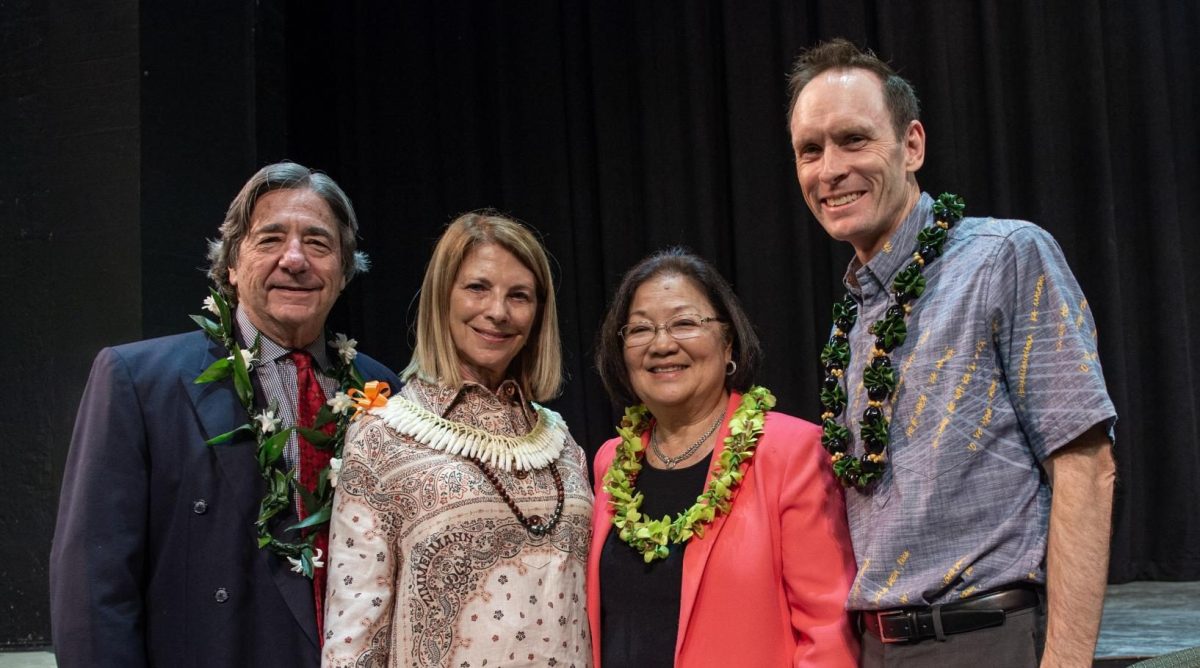At the beginning of April 2024, Senator Mazie Hirono and her Congressional staffers visited our campus for a live Q&A session hosted by the Davis Democracy Initiative. Senator Hirono is an experienced legislator and politician, but she is also a first-generation immigrant. In fact, she is one of few Congresswomen born outside of the United States. Her extensive policy experiences provided insight into current issues, engaging students to discuss Maui’s wildfires, gun policy, public education, and the 2024 election. I attended her lecture in Dillingham Hall and listened as she described her opinions while expanding on her experiences in numerous government positions.
Senator Hirono’s background
Senator Hirono served as the Lieutenant Governor of Hawai’i from 1994-2002. Her legislative career started in Hawaii’s state legislature. Then, from 2007 to 2013, she occupied a seat in the House of Representatives. In 2013, she was voted into the Senate as Hawaii’s first female senator. This year, she occupies one of our two Senate seats and will be running for reelection during the 2024 election.
Moderated questioning with President Latham
Initially, the event began as moderated interview-style questioning between President Latham and Senator Hirono. These moderated questions consisted of student-submitted thoughts and inquiries. Topics ranged from political beliefs, Senator Hirono’s experience as the first Asian American woman in Congress, and the upcoming election.
Another topic she touched on frequently was the Lahaina fires. When President Latham asked about her role in responding to the crisis, Senator Hirono stated how one of her biggest concerns and responsibilities was listening to the vulnerable families. In particular, she noted that it is crucial to highlight the “voices of the community.” She referenced President Biden’s visit to the devastating wildfire sites and how a cultural advisor was present throughout the entire process. Regarding Maui’s future and recovery process, Senator Hirono sounded incredibly hopeful that many struggling businesses and families will be rehabilitated.
Student-led questioning
After President Latham’s last question, students were able to directly ask Senator Hirono their own pressing questions. A microphone was passed between students in the audience filled with high school students from different classes and clubs, middle school classes, and teachers. Namely, U.S. Government, American Studies, Bias in America, and Punahou’s fifth graders were present.
One high school student in particular, asked the Senator about polarization in Congress and how Congressmen and Congresswomen collaborate in a divided space. Senator Hirono responded using the COVID-19 Hate Crimes Act (S.937) as an example, which she introduced in March of 2021. This act addressed the overwhelming influx of Asian and Pacific Islander hate crimes due to COVID-19. Notably with this act, many proposed bills address pressing issues and need to be acted upon as soon as possible. Although she is a Democrat, she said she realizes the necessity of finding a Republican cosponsor. Every time she, or any Senator, attempts to pass a bill, they try to get a sponsor from the opposing party. This makes the bill garner more Senate votes and has a higher likelihood of passing.
With the 2024 Presidential Election coming up this November, some students were curious about Senator Hirono’s position on the Electoral College. Since Hawai’i only holds four electoral votes, they asked how people in Hawai’i can make their voices heard. In response, Senator Hirono eagerly stated, “I think we should get rid of the Electoral College.” Additionally, she emphasized that our individual votes are quite impactful in local elections. We are actively able to decide who occupies school boards, the mayor, district representatives, and a large portion of our local government. With this power, we can invoke change in our communities.
Advice from the Senator
During the moderated questioning session with President Latham, Senator Hirono advised students interested in pursuing government roles or any position requiring them to use their voice.
In the process of advocating for issues and running for Congress, Senator Hirono said she never thought about “finding” her voice; instead, she felt compelled to speak up. Growing up in Hawai’i, she was never very outspoken and her culture never encouraged her to outwardly advocate for herself. However, during the Trump Administration, she learned, “When you have something to say, say it.” Especially working with legislators, she realized that we all have our own voices, and it’s a matter of learning to use them well. To those wishing to enter public service, she said, “My hope and expectation is that you do it because you want to make a difference.” Issues aren’t waiting for Congress to solve them–it’s a matter of taking the action into your own hands to make sure it gets done.

